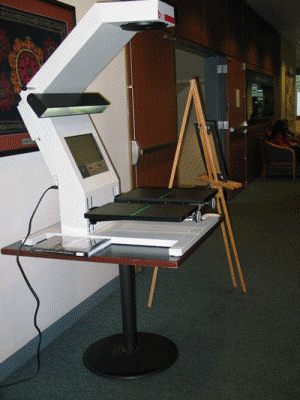
My student assistant was wondering if that thing in the lobby of Snell Library was perhaps some kind of medical device? Well, close, but it does have to do with reproduction! It’s actually an overhead scanner called a Book2Net Kiosk which we are testing out this week, to see what we think about expanding scanning options in the library.
If you haven’t noticed, our photocopiers are aging, and we’re wondering what to do about replacing them. Does everyone who uses them really need paper? Would a .pdf or .jpg file do as well? Are the Infocommons scanners adequate and convenient?
For myself, I feel that sometimes you just need paper, and I’d like us to continue to offer at least one copier even if it means dropping a dime now and then. At the same time, the copiers have a lot of limitations. Unlike the copiers, this scanner offers color reproduction, the ability to copy large items like maps, and it won’t break the spines of our bound periodical volumes.
I haven’t experimented with advanced features, but I believe this particular machine can zoom, pan, and rotate in the advanced mode.
Try it next time you’re here. It’s very easy to use, just bring a flash drive to save your documents. And let us know what you think!
Is it about time for new reproductive technology at Snell?

